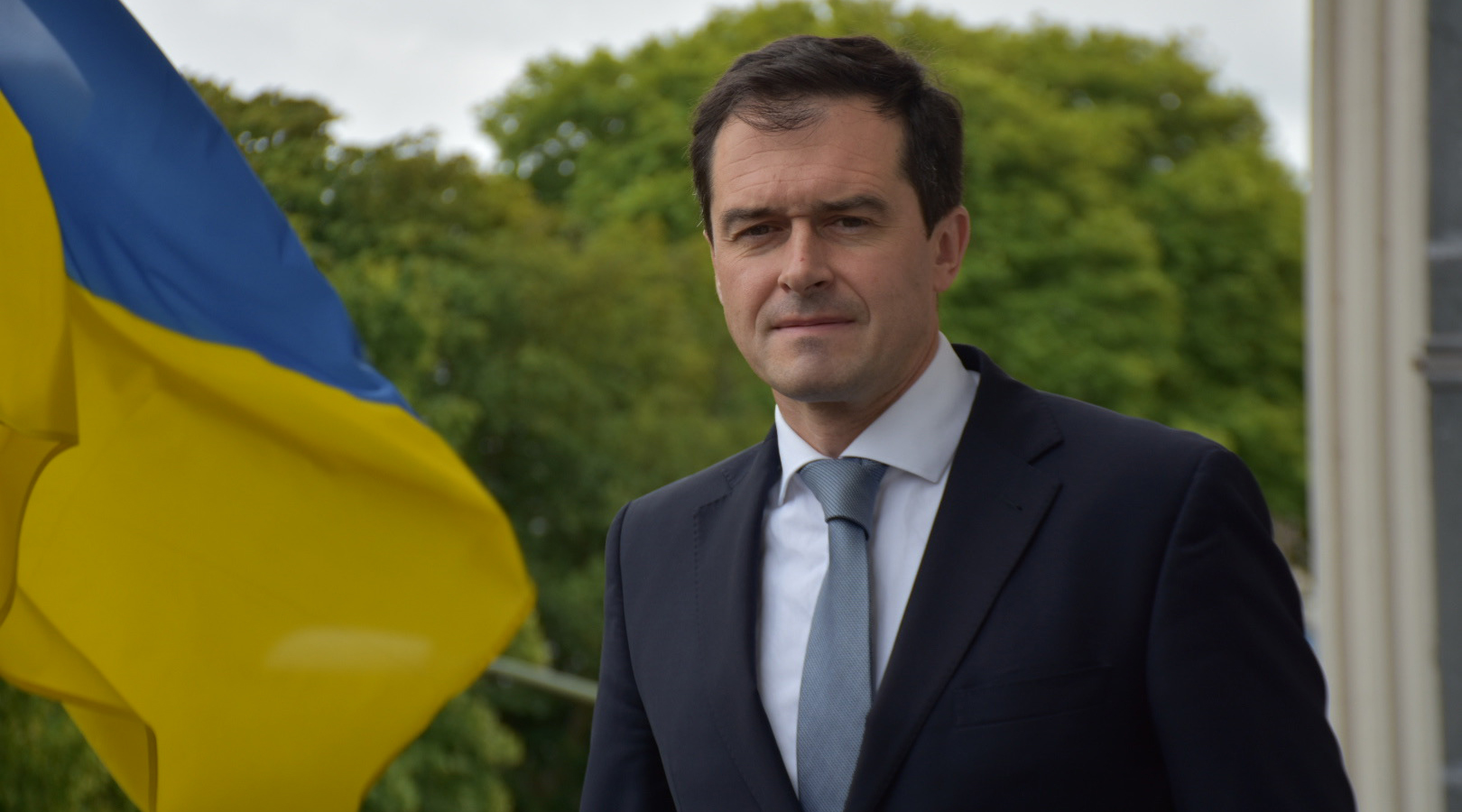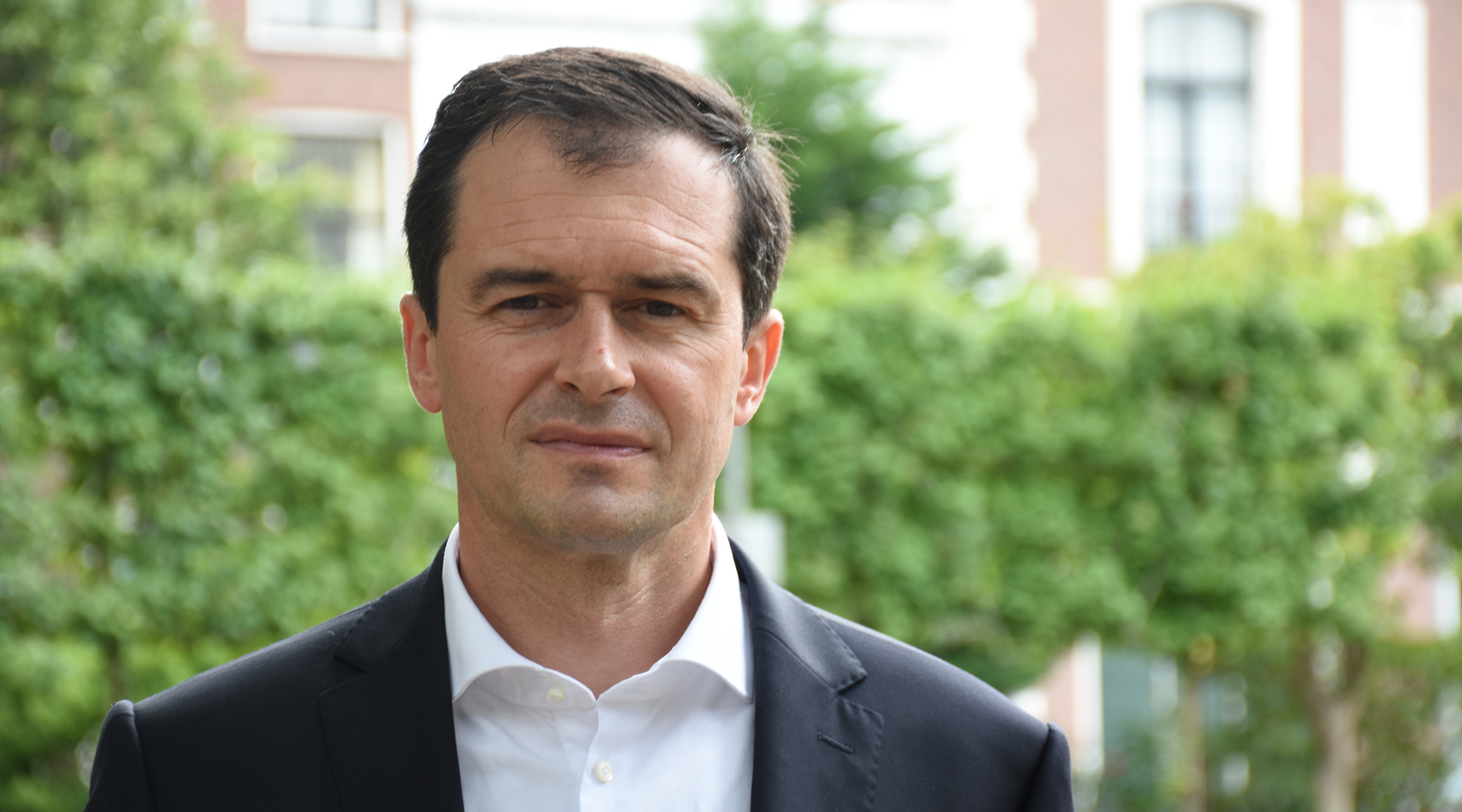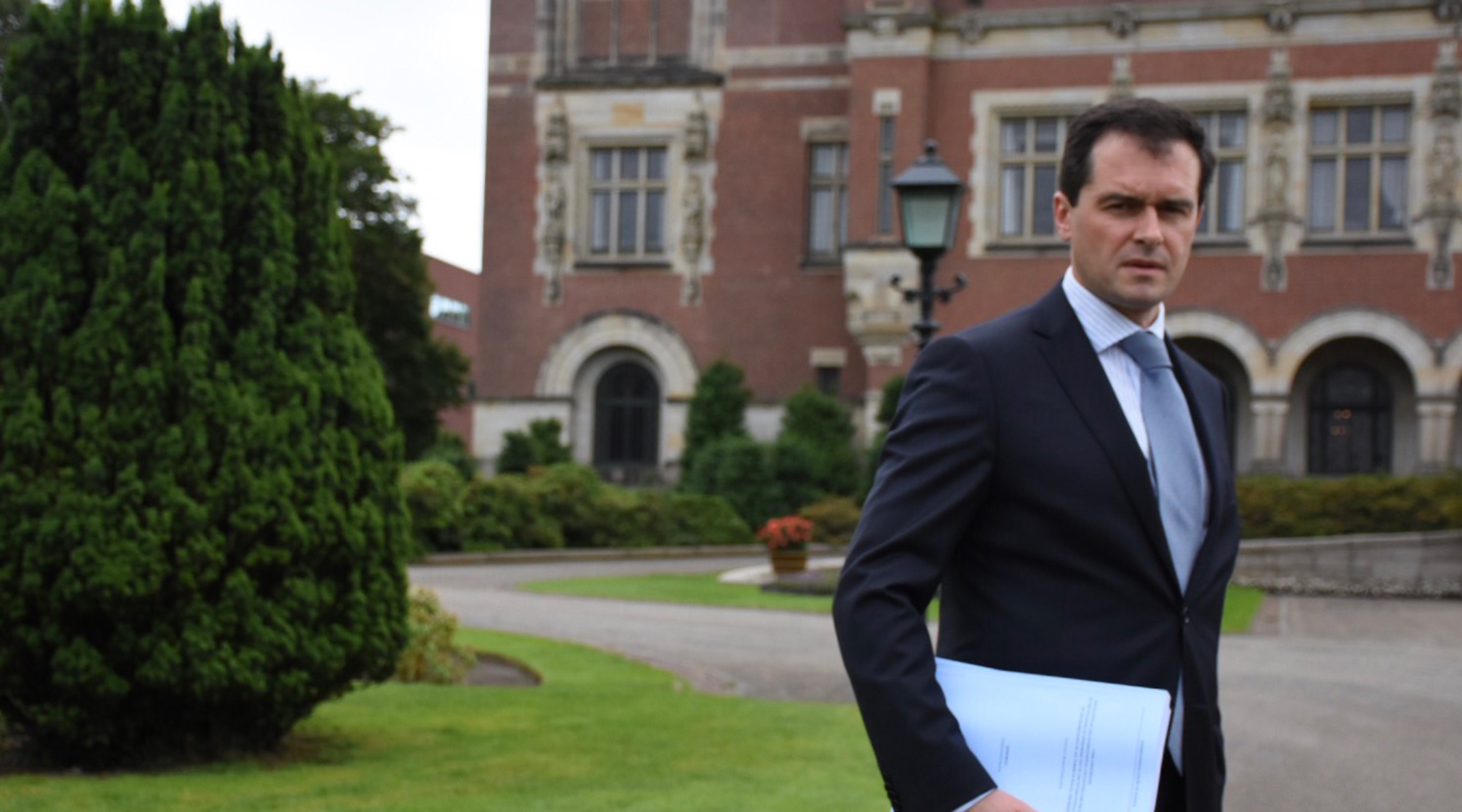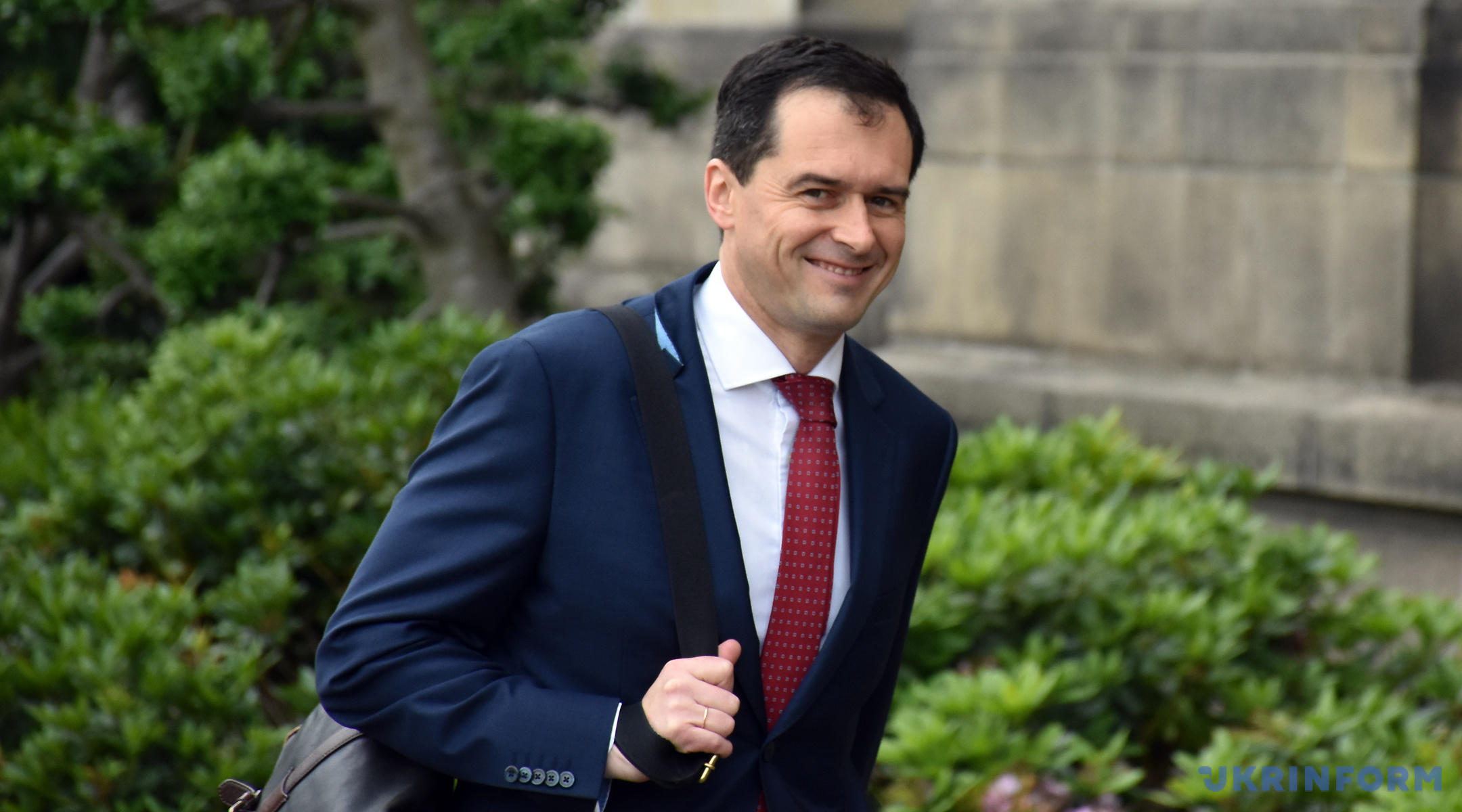Ukraine’s Representative to the EU, Ambassador Vsevolod Chentsov, can be seen more often at various events and as part of state delegations than in his own office. Despite the fact that the Ukrainian diplomat's schedule is becoming tighter over time, he found an opportunity to tell Ukrinform about the EU's solidarity with Ukraine in its fight against Russian aggression, common interests of the parties, prospects for Ukraine's post-war recovery, and its persistent progress toward EU membership.
EU AID TO UKRAINE – SHOW OF SYMPATHY AND PROTECTION OF OWN INTERESTS
- In the statements voiced by Ukrainian and Western politicians, there is often a statement of fact: the EU stands in solidarity with Ukraine in its fight against Russian invasion and provides substantial political, economic, financial, military, and humanitarian assistance. But the West, objectively, has a very pragmatic vision of the world. Why do the EU countries help us on such a scale? What is their interest in this?
- This is a legitimate question. We need to understand the motives of our partners. There are several of them.
The first is a purely human, humanitarian component. There is a victim of aggression, and there is an aggressor. They help those who are in trouble. Now Ukraine needs this help, and it comes not only from European institutions. From the first days and weeks of the Russian invasion, there was a strong response from member states, our neighbors. This is how this logic works at the level of interstate relations.
The second point is our perspective, the future of our relations with the European Union and their logic. This is also a factor that works. Since last June, Ukraine has been officially considered as a candidate country, as a future member of the European Union.
Accordingly, in addition to the ethical moment, there is also a rational one. They not only help us in addressing immediate needs, within the framework of crisis management, but also contribute to the creation of tools that will be used in the future and continue to work even after we win this war. An example lying on the surface is the creation of European "solidarity corridors" for our exports. It is about improving the procedures, infrastructure, and equipment of checkpoints, that is, it is a long-term project that allows for achieving several goals at once.

EU AND ITS VALUES ARE ALREADY THE TARGETS OF RUSSIA’S HYBRID ATTACKS
- The war raises, first of all, the issue of security. Do our partners understand that Ukraine is now protecting them from a blow, from a potential Russian invasion?
- This understanding is very clear, first of all in those EU countries that were "lucky" to be part of the Soviet bloc back in the day. These countries directly felt the Soviet boot and saw Soviet tanks on their soil. First of all, these countries were concerned about the threat Russia is posing. They were not heard for a long time, but finally, such concerns were accepted.
In the current situation, in addition to the leveling of military and security risks, there is also the concept of European solidarity with those who defend themselves. There should be a comprehensive approach here, since this war and Russian aggression in general have a hybrid nature. Therefore, much is being done to invest in security in a broader context, including, for example, cyber security or the fight against disinformation.
In this part, in these segments, the European Union, as well as its values and way of life, are already the targets of Russian attacks. Considering this threat, member states assess the potential risks of direct military aggression on the part of Russia. They understandably seek to avoid this development and have a very specific interest in working with us in the security field.
OTHER COUNTRIES ACROSS THE WORLD NEED TO BE SHOWN EXAMPLES TO EXPLAIN WHAT WAR IS
- Ukraine is currently going through acute pain, which leads to a certain "Ukraine-centricity". How can we convey this pain of ours to people in both Europe and the rest of the world so that our partners do not shift their attention from this war, so that they perceive it as it is, with all the global threats involved? After all, obviously, Ukraine is not the only point of tension globally.
- Someone else's pain, of course, can’t be perceived as acutely as one's own. Therefore, we have to explain, very clearly and very elaborately, in detail, what the essence of aggression is, what is happening – in numbers and images. It is important that this information reaches decision makers and the general public.
Recently, for example, we discussed one such project regarding the town of Irpin, 70 percent of which was destroyed by Russian invaders. This helps people beyond Ukraine understand what their own cities might look like if Russian bombs hit them. This does help. Otherwise, all this pain, all these losses – they are too abstract for people who have not experienced any of that. And the farther from Ukraine, the more acute the issue is.
UKRAINE SHOULD INDIVIDUALLY APPROACH CONCERNS OF THE COUNTRIES ACROSS THE GLOBAL SOUTH
- EU High Representative Josep Borrell recently spoke about this – not all countries perceive Russian aggression against Ukraine equally adequately, especially in the countries of the so-called Global South, which suffer greatly from war-related food, energy, and economic crises. How big is this problem as seen from Ukraine and what are the ways to address it?
- This is a difficult question. The Global South factor does exist. I believe we should treat each country carefully, approach them individually, and understand what their interests and concerns are, what are their historical features. If we talk about Latin America, it has its own circumstances, such as, for example, the phenomenon of anti-Americanism or historical ties, once with the Soviet Union, and then with Russia.
We probably have to find the right words for each audience. That’s not to be limited to official contacts at the level of parliaments, but to work at the level of intellectuals, those who shape public opinion. Of course, this discourse should not be simplified. We have to explain things to people using very simple examples. For example, we have to say that here, in Ukraine, people are killed, as it used to happen in other countries, albeit under different circumstances.
All this ideological bubble, which the Russian Federation and Russian propaganda are trying to impose, should just be pushed aside. A spade must be called a spade. That’s to convince people that aggression and killings have no justification through any imposed "ideological nuances" or the Russian version of "historical truth". We already have experience in doing such work.
Of course, words are even more persuasive when followed by action. The Grain from Ukraine initiative is one such project, which allowed for delivering food to the countries in Africa that are most in need. If there is such a positive experience, we should rely on it, of course, taking into account the peculiarities of other regions, in both Africa, Asia, and Latin America.

UKRAINE SEEKS SOLIDARITY OF UN COUNTRIES IN ESTABLISHING A SPECIAL TRIBUNAL FOR RUSSIA’S CRIMES
- But it is precisely on these countries that Ukraine's support in the UN depends, which, in turn, is a prerequisite for the creation of a tribunal to hold the Russian Federation and its leadership accountable for war crimes in Ukraine. How effective is the EU's assistance in forming such a position regarding the situation of Ukraine within the framework of the United Nations?
- Actually, it depends not only on the European Union. Our goal is to create a Special Tribunal as an effective and efficient tool to bring the Russian leadership to justice for the crime of aggression. Currently, such work is ongoing, including within the framework of the General Assembly, where it is really necessary to consolidate efforts so that we can reach the required number of votes in support of the move.
The European Union, of course, can and does help us. This happened during the voting of previous resolutions of the General Assembly on Ukraine, when the diplomatic presence of the EU countries and their influence on the countries of the Global South were very notable.
At the same time, it should be kept in mind that in many countries of Africa and Asia, there are fears and "sensitive issues" in their relations with Russia, which must be addressed. There are also different approaches among the EU countries, especially in the matter of specific ways of bringing the Kremlin leadership to account for the crime of aggression. These are difficult issues, and there is ongoing work to find answers to ensure the result when the time is right for such a vote.
EU COUNTRIES PROVIDE UKRAINE WITH WEAPONS IT SPECIFICALLY REQUESTS
- In the context of military aid to Ukraine, the EU decided to provide one million artillery rounds before the end of this year. When can these munitions arrive in Ukraine? Are we talking days, weeks, or months? As a followup, just now the European media reported some controversial news that the member states provide Ukraine with obsolete weapons, demanding compensation for them as if they were new. How justified are such reservations?
- There is a general principle that applies to both ammunition and weapons. The European Union sends Ukraine only what we declare as a priority. Accordingly, Ukraine receives only the weapons and ammunition it really needs, and EU member states can receive compensation only for these weapons. This is how this mechanism works within the framework of the European Peace Fund.
Of course, we are interested in and follow the discussions within the European Union on this matter. But it is a sovereign decision of the EU member states on how they solve their issues in the field of defense. Our main task is to get quickly what we need to defend against Russian aggression.
You mentioned a million artillery rounds. Indeed, such a goal was declared in response to the so-called Estonian initiative. We need to give credit to Estonia and other member states, their leadership, as they were able to go from the idea that was voiced at the European Council meeting to the adoption of a legal decision within a month. This is, by EU standards, a very fast pace of decision-making.
One million shells is the stated goal. To achieve this goal, it is necessary to take from depots what’s already there and provide certain incentives to member states to speed up the process, which involves the mechanism of providing certain compensation. Member states have been providing Ukraine with various types of weapons for more than a year already, and, it should be noted, they do it immediately, at our request, without awaiting compensation. This is true solidarity. They first hand over the weapons, and only after that do they file paperwork and wait for compensation from the so-called Clearance House, a facility within the European Peace Fund.
As for ammunition, the EU allocated EUR 1 billion specifically to pace up the supply of ammunition as part of the "munitions initiative." We are talking about projectiles that are already in stock or are coming from industry.
Another billion euros is allocated for increasing the capabilities of the European defense industry in the production of artillery rounds. It is practically a matter of restarting production, since there was no need to increase it until now. The EU industry, under any circumstances, proceeds from commercial interests, so the acceleration of such ammunition production is possible only is a significant order is placed.
The EU found an option: a collective order for ammunition production, which contributed to the fact that the European industry began to move very quickly. But this process takes time. Therefore, unfortunately, no one can give a concrete answer when these rounds will arrive in Ukraine - tomorrow or the day after tomorrow - for several reasons. Let's hope it happens quickly.
UKRAINE’S PEACE PLAN: BROAD INTERNATIONAL SUPPORT IS NEEDED
- Russia's war against Ukraine fundamentally changed the approach of Europeans to issues of security and defense. Ukraine has its own vision of this system’s future. In particular, President Zelensky's peace plan envisages, among other things, the obligation of European countries to provide Ukraine with such defense capabilities that would make impossible even the Kremlin's very idea of a new military aggression. To what extent are Europeans aware of Ukraine's peace plan? Do they support it?
- We have been working with institutions and individual member states to support this plan for quite some time. In principle, our partners perceive all its elements. Work is currently underway to set up the event at the highest level.
In our interaction with the European Union, there is an understanding that this initiative should not be perceived as a global confrontation between the West and East, although this is exactly how the Russian Federation tries to portray this situation. We are trying to involve as broad a field of actors as possible in this initiative in order to agree on leadership in certain directions of this plan.
It is clear that such work should be done first of all, by Ukraine, but also shared with our partners, with European institutions, with the countries of the Group of Seven, and other states that are interested in strengthening certain elements of international security. These can be areas such as nuclear safety, food safety, and others. Accordingly, the countries of the Persian Gulf or China, which has also announced its initiatives, can join their implementation.
By the way, certain provisions of the Chinese platform are consistent with President Zelensky's initiative, in particular, regarding respect for territorial integrity or compliance with nuclear safety. The task here is to find points of contact and achieve the widest possible international support for our peace plan.

UKRAINE IS EXPECTING EU'S DECISION ON STARTING MEMBERSHIP TALKS THIS YEAR
- Let's hope that our partners already perceive us as a future member of the European Union. In this dimension, we are approaching the previously announced spring oral assessment by the European Commission of our progress toward membership. What has Ukraine already managed to do, what still needs to be given priority attention?
- As far as the legislative component of the process is concerned, the work on the implementation of the seven recommendations of the European Commission, in principle, can be considered complete. There are concrete achievements, in particular, the successful appointment of key officials. This applies to the leadership of NABU, Specialized Anti-corruption Prosecutor's Office, and the launch of the High Qualification Commission of Judges. That is, from the moment these recommendations were handed to Ukraine, the corresponding processes were significantly accelerated.
Today, a sort of "fine-tuning" of relevant solutions is taking place. We’re doing this in coordination and consultation with both the European Commission, which is preparing this interim assessment, and Member States to understand how they perceive all that we are doing. We also listen carefully and hear what we are advised.
We expect that the spring, or interim, oral assessment will turn out positive; we have every chance that such an assessment will be good. Recommendations may also be provided to finally cover all the points that need to be worked on. Our goal is that in the annual report, which is drafted throughout the year and will be presented this fall, the European Commission can finally recommend that the Council of the EU proceed to the next stage, i.e. to the start of membership negotiations. We hope that such a decision will have been made by the end of this year so that we can start practical work early next year.
IN THE PROCESS OF ENLARGEMENT, UKRAINE WILL HELP OTHER CANDIDATE COUNTRIES
- Regarding the pace... Certain European politicians claim Ukraine can’t move forward with EU membership too quickly, not only because of the procedure to be followed but also because there are other candidate countries, particularly in the Western Balkans, which have been waiting for decades to kick off membership talks. How will such circumstances affect the attitude of European partners toward Ukraine’s integration? Won’t this cause tension in relations with the countries in the Balkan region?
- It so happened that Ukraine is currently the main driver of the expansion process. Probably, some countries of the Balkan region also had the opportunity to move to a new level of practical interaction with the EU in the matter of integration. I believe that there should not be any jealousy in their attitude towards Ukraine's progress; on the contrary – we expect Ukraine's support in this process. Accordingly, we are ready to back the efforts of our Balkan partners and take advantage of their experience already gained in the process of integration. In some areas, we can also show something. Therefore, I think it should be a mutually beneficial and joint process. We must overcome all obstacles and barriers together, not create any artificial preconditions ourselves. It is worth avoiding any politicization of the entire process of European integration and focusing on practical achievements.
Of course, there is always a powerful political element in EU enlargement processes, as it is always a geopolitical decision. But each country should be evaluated according to its own achievements, based on a "merit-based approach". This is clear to all candidate countries, no one opposes this principle. Reforms are not implemented just for reporting – the state needs them. Today, we see no obstacles that could stand in the way of a positive decision by the European Commission.
In the summer, when the issue of granting Ukraine the status of a candidate country was decided, EU leaders found a balanced solution. I think this approach will also be taken when discussing the next stage of our progress toward membership. Here, each party can and should protect its interest, both Ukraine and the European Union. All the waves of enlargement only strengthened the EU and brought economic benefits, even to those countries that opposed such enlargement. That's how it should be here.
UKRAINE AND THE EUROPEAN COMMISSION WORK TOGETHER ON THE POST-WAR RECOVERY PLAN
- The war has already caused Ukraine enormous destruction. We have seen international conferences on future recovery, notably in Lugano and Berlin. Was it possible to form a joint approach to the post-war reconstruction of Ukraine based on their outcome?
- Since we are talking in Brussels, it’s logical to mention Ukraine and the EU in matters of recovery. But the circle of actors in this process isn’t limited to these two parties. The circle includes the G7 countries and international financial institutions, such as the World Bank. But, of course, the European Union and European Commission will objectively play a special role in the reconstruction process. This process, in a broad sense, is very closely connected with reforming the economy and social institutions, and with the entire process of expansion. Therefore, the European Commission, in particular the Directorate General of DG NEAR, where a special group for Ukraine support has been created, will perform, together with Ukraine, the role of the secretariat of the common donor platform and will contribute to coordinating these efforts.
As for the concept of recovery or having a broad and extensive plan – all this is currently in the process of drafting. Unfortunately, the war is not over yet.
A World Bank report recently outlined Ukraine's needs, based on which such a plan is being drafted. It is important that it be created with clear coordination between the Government of Ukraine and European Commission. It should be a joint product, it is important to operate the same numbers.
Perhaps, it is more realistic today to talk about rapid reconstruction, for example, of the housing stock and energy infrastructure. It is critical to understand what volumes of funding Ukraine can count on, how we ourselves can use this resource from the perspective of our institutional capabilities. This work should be done at the level of specific projects: what we can do within certain time frames. Right now, our authorities are working on this: the Ministry of Finance, Ministry of Infrastructure, and Ministry of Economy and Trade are the main actors. Accordingly, they coordinate efforts with their counterparts from the European Commission.

LEGAL PROTECTION, TRANSPARENCY, AND ACCOUNTABILITY OF UKRAINE ATTRACT INVESTORS
- But now the situation is unprecedented. There’s never been a construction site of such a scale anywhere the world. Currently, we are talking about investments worth hundreds of billions of euros or dollars, and these are not only contributions from international financial institutions, but also private investments. How should we create conditions to ensure that even amid war, Ukraine was attractive to private investors?
- I believe that this is a common interest and common task of the Ukrainian side, donor community, and European Commission. But first of all, it is our task, and that is understandable.
We have already mentioned the implementation of the same seven steps, recommendations of the European Commission as part of the approach to the start of talks on EU membership. That's exactly what it's all about. Strengthening our anti-corruption institutions and our judicial system are the steps, in my opinion, that should be convincing for foreign investors and donors.
The European Commission and other international institutions are directly increasing their activity. Recently, European Commissioner Johannes Hahn, who is responsible for the budget, visited Kyiv along with representatives of OLAF (Office for the Prevention of Abuse and Fraud - ed.), a structure that ensures that European funds are utilized as intended. In fact, all important instruments of interaction between Ukraine and the EU have relevant references and provisions on transparency and joint control over the use of funds. So this issue is given due attention.
ONLY A STRONG UKRAINE CAN STOP FURTHER RUSSIAN AGGRESSION
- The last question. Even the complete liberation of Ukraine’s territory from Russian invaders will not imply the end of the war. Russia, if it continues to exist in its current form, will gather forces for a new strike. What does the end of the war mean for you? When can it really end and what kind of victory do we seek? This is probably the most important question now...
- I think that the key to our security is a strong army, strong institutions, and a strong civil society so that we are able to defend ourselves. And of course, this is our interaction with partners and allies in the EU and NATO. That’s because we have common threats. Unfortunately, the Russian Federation continues to prove that it cannot be considered a reliable partner either in the sphere of security or in that of economy. I agree that Russia's aggressive stance poses a long-term challenge. Accordingly, we will need to invest and work to strengthen our ability to deter this aggression and prevent similar attacks from occurring in the future. This is exactly what the situation requires, and we will have no other way out.
- Thank you.
Dmytro Shkurko, Brussels
